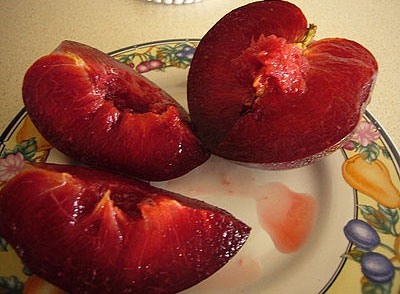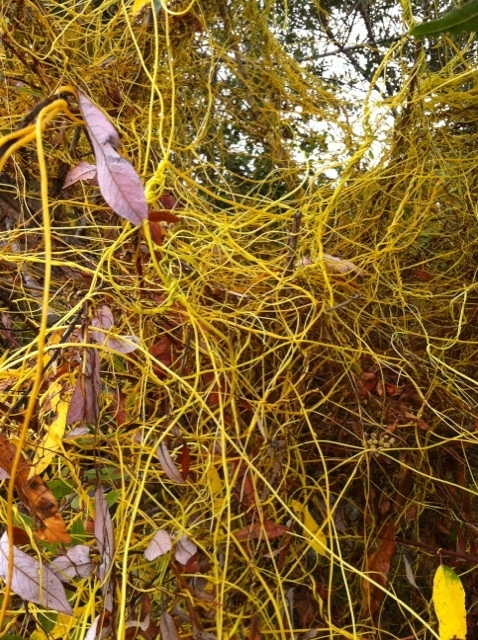
Posts Tagged: fruit
UC CalFresh gets kids to try healthy fruits and veggies
UC CalFresh educators took part in a field trip for fourth-graders in Fresno where the children tasted a wide variety of fresh fruits and vegetables, reported Dale Yurong on ABC 30 Action News.
"We encourage them to try it and then they try it and wind up liking it," said UC CalFresh nutrition educator Kristi Sharp. "That's a saying that we say - you can't judge it unless you try it."
Fresno Unified School District is the state's largest recipient of funds from the fruit and vegetable program, Yurong reported. In addition to including fruits and vegetables at meals, the district is serving grab-and-go fruits and vegetables everyday at recess at 45 elementary schools.
The UC CalFresh Youth Nutrition Education Program, part of UC Cooperative Extension, provides support and resources to pre-school through high school teachers in low-income schools to deliver nutrition and physical activity education in their classrooms.
Local kids learn benefits of eating healthy
Brook Borba, Turlock Journal
The City of Turlock has launched an After School Education Safety program with the Turlock Unified School District and in conjunction with the UC Cooperative Extension and AgLink.com to provide a farmers' market opportunity for local students.
Turlock students learn where food comes from, what types of fruits and vegetables are grown locally and interesting facts associated with food. At the end of the presentation, students are provided with shopping bags to pick out an assorted selection of fresh fruits and vegetables to eat or take home for their families.
Exotic pitahaya possible desert cash crop
A native of Mexico and South American, the beautiful tropical fruit pitahaya - also known as dragon fruit - could be a viable crop for Southern California desert, said an article in the Desert Sun.
Ramiro Lobo, UC Cooperative Extension advisor in San Diego County, shared the results of pitahaya studies conducted in San Diego and Irvine with a group of inland desert farmers recently.
“The fruit size and quality is good ... we’re getting great marketable yields,” Lobo said.
In March, five varieties of the fruit were test-planted at UC Riverside's Coachella Valley Agricultural Research Station in Oasis.
“We’re selecting varieties that can tolerate the heat,” said José Luis Aguiar, UCCE advisor in Riverside County. “They’re doing well in San Diego County and Irvine and we’re trying to extend the range.”

Dragon fruit grows on a cactus plant. (Photo: Jose Luis Aguiar)
Growing a better stone fruit

The story centered around Kingsburg Orchards, one of the largest local tree fruit producers. The organization's board met recently to sample 30 experimental stone fruit varieties.
Kevin Day, UC Cooperative Extension advisor in Tulare County, said the push to find an edge in the marketplace is no surprise in today's highly competitive retail market.
"People are doing anything they can for product differentiation, including having exclusive varieties," Day said. "And the focus is really shifting to flavor."
Other news
Climate change is another reason to protect farmland
Rich Rominger and Renata Brillinger - Sacramento Bee
This op-ed piece references a new report released by the California Natural Resources Agency and the California Energy Commission that focused on a study by Louise Jackson and her team of UC Davis researchers. "Thanks to the team of UC Davis researchers and government funding for their study, we can add climate protection to the compelling list of reasons to invest in the long-term protection of California's farms and ranches," wrote the authors.
Progress reported in efforts to control growing threat to local and state citrus crops
Lance Orozco - KCLU, California Lutheran University Radio
Orozco interviews Ted Batkin of the Citrus Research Board and John Krist of the Ventura County Farm Bureau. In the six-minute story, Krist mentions work by Mark Hoddle, UC Cooperative Extenison specialist in the Department of Entomology at UC Riverside, to introduce natural enemies of Asian citrus psyllid to help bring down populations of the exotic pest.
Breeding fruit that can compete with candy

Zaiger is one of the few private breeders operating on a large commercial and worldwide scale, said UC Davis geneticist and plant breeder Tom Gradziel. U.S. universities and the U.S. Department of Agriculture are typically the powerhouses behind finding successful hybrids, because the process is laborious and time-consuming, exposing a small business to financial risk.
"Breeding fruit is like playing cards," said Gradziel. "You keep reshuffling the deck, and looking at how they come out. There are about 100,000 genes to play with."
Market Watch: A better prune, but will anyone care?
David Karp, Los Angeles Times
Jim Doyle, a now-retired UC Davis fruit breeder who was based at the UC Kearney Agricultural Research and Extension Center, crossed Improved French prune with Tulare Giant, a large-fruited fresh-market European plum, in 1992. The new variety, named Muir Beauty, was irresistibly delicious. Muir is higher in sucrose than French, which has more glucose. Because sucrose tastes sweeter than glucose, Muir tastes sweeter than French, even at the same total sugar content, said Carolyn DeBuse, who helped evaluate the fruit as Doyle's successor in the prune-breeding program from 1999 to 2007. DeBuse is now the UC Cooperative Extension orchard systems farm advisor for Yolo and Solano counties.
Japanese dodder found in Santa Barbara County

Olive fruit fly back
Julie Johnson, Orland Press-Register
There are considerably more olive fruit flies this year than at this time last year, said Bill Krueger, UC Cooperative Extension farm advisor for Tehama and Glenn counties. "When it comes to the olive fruit fly we really don't understand everything we need to know, and this is just one example," he said.
Nonpareils' arrival marks start of big almond harvest
Tim Hearden, Capital Press
Nonpareil almonds have been coming out of the orchards in California, ushering in the harvest of what's expected to be a record 1.95 billion-pound almond crop this year. Hullers and shellers in the San Joaquin Valley got their first loads on Aug. 19. "I think all of our orchards look pretty good," said Rick Buchner, a University of California Cooperative Extension farm advisor. "It's a good crop, really clean."